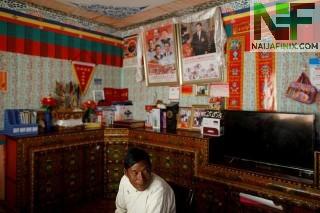Dzekyid, a 54-year-old barley farmer, presents himself as a role model for his neighbours and for the success of China’s efforts to tie economic development to social control in Tibet.

Dzekyid’s well-built house in Jangdam village has a hall filled with Buddhist scriptures and Thangka paintings, and a row of prayer wheels for his religious 76-year-old father, Tenzin, to spin twice a day. As a member of China’s ruling Communist Party, Dzekyid is an atheist.
“This house is possible because of good government policies. My heart is wholly with the party, not even one bit with religion,” said Dzekyid, whose family was showcased to a group of reporters on a government-organised tour of Tibet, an area where access to foreign journalists is normally barred.
Government officials in both Beijing and Tibet vetted the reporters from media organisations who were invited to join the trip. On the closely supervised tour, there was little opportunity to interact with ordinary Tibetans without government officials in attendance.
China is pushing to transform the mindsets and values of Tibetans to bring them into the country’s modern mainstream, which includes urging the region’s devout Buddhists to focus less on religion and more on material prosperity.
“Tibet has some bad old habits, mainly due to the negative influence of religion that emphasises the afterlife and weakens the urge to pursue happiness in the current life,” said Che Dhala, chairman of the Tibet Autonomous Region.
On the trip to Tibet, officials showcased poverty-relief programmes that include relocation of families to better homes, schooling, vocational training, and business development efforts such as a climate-controlled mushroom farm. The efforts are part of China’s push to eradicate rural poverty nationwide by the end of this year.
Officials also described efforts to “manage the minds” of Tibetans, who for centuries lived in a deeply religious society with a belief in reincarnation and a devotion to their spiritual leader.
The head of Caiqutang village, Dekyi Paldron, described how poor households who receive free new government housing “should not” set up a family room for worshipping Buddha, a common feature in traditional Tibetan houses, because they “shouldn’t be two-faced” after benefiting from the atheist Communist Party.
“If space is taken up by the Buddha room, the boy and girl may have to squeeze into one bedroom – this is not ideal for the healthy development of either child,” another official told the visiting journalists.
China seized Tibet after troops entered the region in 1950, in what Beijing calls a “peaceful liberation.”
In 1959, spiritual leader the Dalai Lama fled China after a failed uprising, and the long-impoverished region has been one of the most politically sensitive and restricted parts of China.
Recipients of poverty relief are told to curb their spending on religion and to instead invest in increasing their earning power and in their children.
At a vocational school in Nyingchi, a signboard stated that the school uses ideological and political education to fight against “separatism”, denounce the Dalai Lama and to prevent religion from making people “passive”.
“Ten years ago, villagers competed among themselves to see who donates more to temples. Now they compete to see whose son or daughter has a stable government job, or who owns a car,” Karma Tenpa, deputy propaganda minister for the Tibet Autonomous Region, told Reuters.
Pictures of the Dalai Lama, once commonly displayed in Tibetans’ houses, are banned, but framed posters of President Xi Jinping were visible inside all the homes the journalists were shown.
Propaganda slogans urging allegiance to China and the Communist Party are conspicuous along roadsides and billboards in Tibet.
Critics say China’s efforts linking poverty eradication to an embrace of a secular life and the Communist Party infringe on human rights.
“The Chinese government’s efforts to force Tibetans to change their way of life to the one the government approves is a violation of their fundamental human rights, including their freedoms of thought and religion,” Maya Wang of Human Rights Watch told Reuters.
A recent Reuters report based on official documents described how growing numbers of rural Tibetans were being pushed into recently built training centres, where they are trained to be factory workers in a programme that some critics have called coercive – a characterisation China rejects.
“At first we have to go around explaining to the nomads and herders why they should go for skills training to earn higher wages. Now that they see the benefit of doing so, they come to us automatically,” Lin Bei, a poverty alleviation official, told Reuters.
Families who practise good hygiene or have other desirable attributes receive credits for goods such as washing powder or towels, Lin said. The best are listed as “Five Star Families” on the village notice board.
Those deemed to show undesirable behaviour are named and shamed.
“If someone has been lazy, drunk alcohol, hung out at the teahouse or played games instead of taking care of his family, we will call him out at the village meeting,” said Lin, who is a member of China’s ethnic Han majority.
Dzekyid, who like many Tibetans uses only one name, encourages his neighbours to support the party and its programmes. His house was built with a government grant of nearly $20,000.
“Praying to the gods and Buddha can’t get me this,” he told Reuters.
Reuters


Share your thoughts